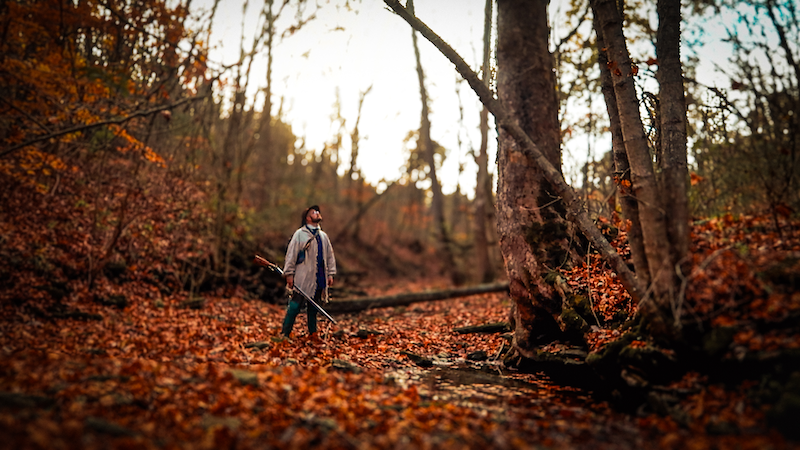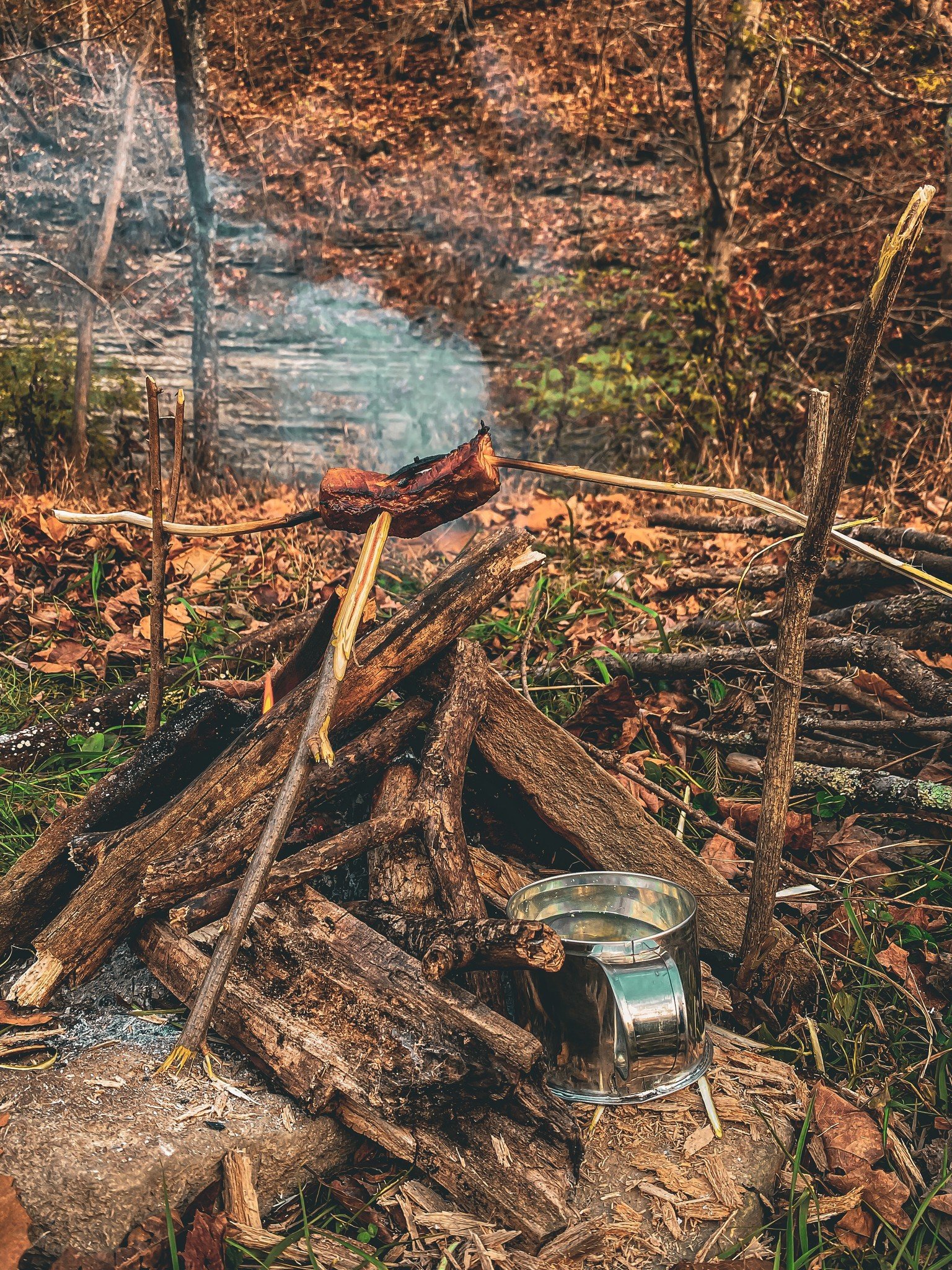Can I Survive 24 Hours in the 18th Century? | Historic Trekking | Basic Gear
Today I'm putting down the books and putting my skills to test. I want to know if I can survive 24 hours in the 18th Century. I'm using only 18th-century tools and equipment, sleeping under a wool blanket with no tent, no electricity, and no help.












This expedition is the culmination of the last two years of my research into the 18th Century.
I’ve worked hard to improve my impression and understanding, but now It’s time to put down the books and put myself to the test.
I’m bringing only what I can carry on my back, and everything I’m using has documented roots to our ancestors in the 1700s.
This is as close as I can get to understanding a small portion of their lives.
I’m carrying all of my gear on my back in my blanket roll using a tumpline as many did in the 18th century
I have no tent, no waterproof cover, I’ll be sleeping with two wool blankets and my shirt as a pillow.
I don’t know how well this is going to go, it could go horribly wrong, but I have emergency plans in place as well as first aid.
In hour one I make camp on the rim of a dry creek bank.
In the summer This creek can go from dry to roaring in hours, but in late autumn that time has passed.
I spent the first hour establishing my camp, gathering firewood, and starting a small fire.
My goal is to always have embers resting in camp.
At the start of hour 2, I dug into my 18th century rations for a snack before setting out into the wilderness, surveying the land for game trails and signs of human activity.
It’s hard to overstate how different it is to navigate the woods in 18th-century equipment.
My colonial buckle shoes have no tread like modern boots, but the thin souls allow me to feel the forest floor, reading the land beneath the leaves, guiding me across rock ridges, fallen trees, and through creekbeds.
With each step, I feel as if I am part of the woods, rather than simply traveling through it.
To finish out hour 3 I stopped for a moment at the top of the hill, watching birds planning for winter as the chipmunks did the same. Across the ridge, I hear a turkey gobble.
The trees have all but lost their leaves for the year, winter is ahead of us now and we all want to survive.
What must it have been like in the 1700s to see the autumn leaves change? Was it as beautiful as it is today, or was it a ticking clock, a reminder of harder months ahead?
I spend hour 4 slowly making my way down the hill, a trickier task than traveling up.
I gather my thoughts and focus on crossing the hill instead of sliding down, this proves safer and more efficient.
HOUR 5
I walked a total of 8 miles this afternoon, my feet and calves ache but my spirit is high.
I’ll finish out this hour resting at camp, soaking up the warm sun and preparing for the hours ahead
HOUR 6
In hour 6 I fashion a rotisserie out of a sapling, stoke my fire, and begin roasting my ration of pork.
Before gathering more firewood, hoping it would be enough to get me through the approaching night chill
HOUR 7 and 8
By hour 7 the is falling behind the hill now in hour 7 and I take a chance in the last of the light to trek up an old creekbed.
Each step through this creek gets a little colder, the remaining sweat from my hill climb runs cold as it soaks into my shirt.
The rest of hours 7 and 8 is spent in the creekbed, exploring the remnants of ancient rocks and the fossils within.
I love traveling these old creekbeds, they are primordial archives of a world long gone.
HOUR 9
With the sun rapidly setting I return to camp for dinner. The roasted pork, apples, cheese and stale bread is a welcome feast after a day of exploring, but my modern stomach begins to groan, begging for more where I have none.
Periods of hunger and discomfort are common in 18th century accounts, sometimes more than abundance
I wanted to experience something similar and have purposefully packed a minimal amount of food to closer understand these accounts.
HOUR 10
Light begins to wane in hour 10 as the black blanket of night covers the woods. I consolidate my camp and crawl between my blankets, already looking forward to morning.
It’s difficult to capture on camera but the night sky was gorgeous. With no clouds and no artificial light for miles, I see more stars than I’ve seen in some time.
This moment where I am alone in the woods, watching the stars is a reminder that I need to slow down and ensure I share these moments with my daughter when she is ready.
HOUR 11
An hour later I am awoken from my slumber by what sounds like a 12 foot tall monster stomping through the woods. A doe would soon cross the creekbed near my camp, revealing herself.
Loosening the grip on my rifle and tomahawk, I crawl back under my wool and count the stars.
HOUR 12
I surge awake but this time on my own account, my fire is out and somehow my body knew to wake me. The night chill is settling in but I have some embers still glowing in the pit.
The fire cracks and pops before sleep pulls me into the night once again.
HOUR 14
Early into hour 14 I wake again, but this time from a deep sleep, the kind of sleep where you don’t move, you are dead to the world.
Opening my eyes I have to blink to verify I’m not dreaming, somehow the night sky is darker with my eyes open.
Cold, so cold
My body is stiff, my toes numb and my fingers are slow to move, as if they have rusted in place
I roll my head towards my fire to find it extinguished, gone, the night cold has taken its warmth.
I have not an ember to my name.
With haste I retrieve my knit cap and mittens from my wallet, next come my wool stockings.
My laziness in getting to bed has now come for me and I need to don my warm clothes in pitch black if I am going to warm enough to restart my fire.
Flint, steel, tinder, a task on it’s own in the daylight but in the early hours of the day? It feels monumental
My tinder is damp from the night dew, my cold fingers drop my flint in the dark
For a moment I consider that packing up and trekking out of the woods would provide me the warmth to survive
I disregard this notion.
A spark catches, one grain of light in the inky black world
As carefully as the first time I held my baby, I rest the ember in my tinder, begging it to grow
It is hard to describe the amount of sheer focus afforded to you when you are cold and damp and trying to start a fire in the middle of the night.
I know I could have given up and returned home to safety, but in those moments, it was real.
I spend the next two hours sitting near the fire wrapped in wool.
HOUR 16
The calls from my stomach become too much to ignore and I dip into my rations for the coming day, hoping that digestion of 2 biscuits brings some warmth to my core
HOUR 17
I create a sleeping bag of sorts with my wool in an attempt to protect my face from the increasing chill and slowly fall asleep.
It’s incredible to me how difficult it is to get your body to relax enough to fall asleep when you are cold and surrounded by the noises of the woods.
I recognize that I’m a woos compared to our ancestors, but can you imagine trying to get a good night’s sleep in a hostile, ancient forest?
I’ll be thinking of this before I ever complain about a bad night’s sleep.
HOUR 20
The migratory songbirds are the first to wake as the sun rises with me rising soon after.
The last few hours proved to be some of the best sleep I’ve had in weeks and although my back is calling for a modern bed, I feel a sense of accomplishment as I unroll my wool and tend the fire.
My priority this morning is to get hot water and make a generous amount of coffee.
I’m reminded of my grandfather’s stories of “Coffee soup” during the great depression where his mother would make coffee and serve them old bread in the coffee for a simple meal.
I find myself doing the same this morning, dipping my stale bread in coffee so that I may chew it.
With water running low, I set aside a portion of it for some oats and another portion to have for my trek out later today.
HOUR 21
After some time the cold blue blanket of night recedes as the warmth of the sun climbs the hill, changing the landscape into a welcoming embrace.
With no pressing tasks or threats of attack, I take a moment to be thankful for another day.
I trade my knit cap and nightshirt for my hunting shirt and hat before taking my oatmeal up the creek for an exploratory breakfast.
My breakfast spot this morning is a fallen tree, rotting but not rotten enough to collapse under my weight. The squirrels and chipmunks are stirring now, moving nuts and forgetting them soon after I imagine.
They say a squirrel used to travel from the East Coast to the Mississippi without touching the ground, by my guess the squirrels are working hard to make that possible again.
Returning to camp I break my fire and wash my kettle with water and ash.
I return the rocks from my pit to the creek and the small amount of leftover wood to the forest floor before rolling my pack and setting out for one last hike.
In total, I walked just over 12 miles during this trip.
HOUR 24
I’m taking the long way out of the woods today, spending the last few hours much like I did the first.
The long walk affords me a moment to think, whether that's good or bad I’ll leave to you.
This was, in many ways, a short trip for me. I’m sure many of you have been out for longer, but I’m returning to my wife, daughter, and the hustle of the 21st century with a renewed perspective
Our ancestors endured countless hardships for us to be here and this trip reminded me of that.
I’m leaving the woods this day centered, with a little more understanding of the past. As always, I’m excited to learn more.